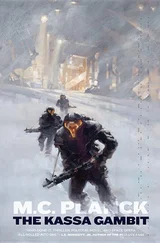“All respect, sir, why are you still with the Kel?”
His tone hadn’t been respectful in the slightest, but Isaure didn’t seem to care. “Because the Kel need me,” she said. Niaad’s skin crawled. “Any other corporal would be rooted here. I see a job to be done and we’re going to do it. If I’m not mistaken, the heretics are setting up some weapon to cover the approaches, and they’re worried it’ll hit them too or they’d have moved in. You were paying attention to the reports, right? Anyway, best to hit them from behind.”
“Sir, there are only two of us!”
“Look, soldier, if you love life so much, why the fuck did you sign on to be a suicide hawk? Come on, let’s see how many weapons we can carry.”
Nirai didn’t feel sanguine about the number of grenades he was loaded down with. On the other hand, Isaure was a crack shot, and if anyone was going to be the beast of burden, it was him.
Isaure knew exactly where they were going, even if she was crazy. They entered residences of necessity. This was the one ward built hive-fashion. In order to get anywhere in the hive segments, you went through people’s homes and offices, rooms nestled up to each other like cells, and only the occasional corridor, more to transport goods than people. Some Rahal must have come up with the layout. He couldn’t see any other faction thinking of it.
The first time they encountered civilians – at least, Niaad assumed from their ornate coats and spangly jewelry that they were civilians – he was astonished by how decisively Isaure killed them, three quick bursts, red holes. He had barely gotten a look at their faces.
“They would have been screamers,” Isaure said, although Niaad hadn’t opened his mouth. “I can’t stand screamers.”
Most of the civilians got no chance to scream.
They went in and out of rooms as though they were burrowing beetles, occasionally cutting passages through walls with equipment that Isaure was not supposed to have. Niaad hadn’t thought it was possible to get any more lost, but he didn’t want to distract Isaure by asking where they were. He became fascinated by the objects people kept in their homes. Musical instruments that could have doubled as Vidona torture implements, especially the ones with the hungry wires. Floating globes that imitated pleasing weather patterns on green or purple planets. A collection of cat toys, but thankfully no trace of the cat itself. Isaure would probably classify a cat as a screamer.
Isaure kept consulting the field scanner, drilling holes, and muttering about angles of fire. Niaad was amazed no one heard the drill. It was quiet, but he could hear the whir as clearly as though it were biting into the lobes of his brain.
“There they are,” Isaure said. “They’ve been taking down walls, you can’t mistake the signs.” Her patient voice suggested that she didn’t care whether Niaad understood the situation. “It’s where I thought it would be.”
She pulled away from the latest hole. “All right. There’s a machine down that passage. We need to light it up so our people know something’s there. If we run like hell we can make it.” She had kept the cracked bit of tile; she drew with it now. At least she was no longer diagramming with dead people’s fluids.
“They’ll see us coming, sir.”
“They’ll see you coming,” Isaure said. “I’ll provide covering fire. I just want you to lob as many of the grenades as you can at that machine, get some explosions going.”
“We could pick off a few of them first, sir –”
“Soldier,” Isaure said crushingly, “did I give you permission to think? Charge straight in, throw grenades, get the hell out. I’ve given you instructions. Acknowledge.”
“Acknowledged, sir,” Niaad said, despite a sincere desire to tell her to fuck a jackhammer.
“Go,” Isaure said, gesturing with her scorch rifle.
Niaad was already having trouble with his peripheral vision. He kept having to swing his head from side to side to check his surroundings. It wasn’t until Isaure shook his shoulder that he realized his hearing was half-gone, too. The stress effects wouldn’t have set in so early in a properly tuned Kel.
“There’s the gauntlet,” Isaure said. “Sloppy guards, no one’s facing our way. Their misfortune, our gain. Get in, lob the grenades, get out. I’ll cover you. Simple.”
“Yes, sir,” he whispered. Stupid plan, but he had to obey.
“Good man. We’ll make a Kel of you yet. Go!”
Niaad shuffled at first because he couldn’t get his legs to cooperate. The noise alerted them. He primed one grenade and threw poorly, well short of the machine. It was hard not to be hypnotized by its red glow and wires and strange gears.
The heretics’ guards may have been careless, but they weren’t fools. One of them kicked the grenade down the corridor. The others swung up their rifles.
Niaad was too terrified to move.
Which, he realized in a slow crystal moment, was what Corporal Isaure had counted on. She fired four times in rapid succession, cool and precise: once to scorch out his knee, pitching him forward and closer to the machine, and three more to trigger the grenades.
Whether he was close enough for the grenades to do any damage to the mystery machine was a question Kel Niaad never found out the answer to.
Kel Isaure was already sprinting away from the explosion. She had gotten what she wanted. Now it was time to rejoin the Kel and show them what they needed to do.
SERVITOR 244666 HADN’T intended to get caught. Of course, people rarely did. But it would have gotten away with its illicit snooping if it hadn’t been for a flickering glitch in the cindermoth’s variable layout, consequence of a moment’s power fluctuation. It had been coming out of Cheris’s quarters after having planted the bug. As luck would have it, another servitor, 819825, spotted it through the moment’s window between the brevet general’s quarters and the high halls that were, ordinarily, a right turn and a few minutes away.
It wasn’t that servitors were precisely forbidden to enter humans’ quarters. The maintenance work and routine chores that were their responsibility necessitated it, although they made a point of knocking as a matter of courtesy. Some of the humans would shoo them off if it was an inconvenient moment, but in general they didn’t think much of it, an attitude the servitors themselves had encouraged during the scant centuries of their sentience.
The servitors themselves, however, had their own rules to govern how they went about their duties. It was always fair to enter if duty required it, or, in rare cases like Cheris’s, if they were invited to socialize. It was not, according to servitor consensus, fair to drop bugs into the brevet general’s quarters for around-the-clock monitoring even if you were the lead servitor assigned to keep tabs on her whenever she was in the moth’s public areas.
At present, 244666 folded up its limbs, hinges neat and precise, and stared patiently at 819825, who had volunteered to serve as its guard or companion, take your pick. They were both shut up in one of the service corridors, dark except when they flashed prickly comments at each other, for remedial meditation. You could hear a lot here, especially with a servitor’s senses, although they were circumspect in how they used their scan capabilities. At the moment what they got was the occasional exchange between the humans below them, including a Kel joke or two; footsteps, superstitious one-two-three-four knockings on the walls, the whoosh of air circulating, the quiet whisking of other servitors hovering through the passages.
819825 had reported 244666 to the other servitors, and they had summoned it to explain itself. 244666 had shown up; it didn’t have many places to hide, and besides, it might have some philosophical differences with its fellows, but it didn’t want to defy the most important rules of servitor society.
Читать дальше












